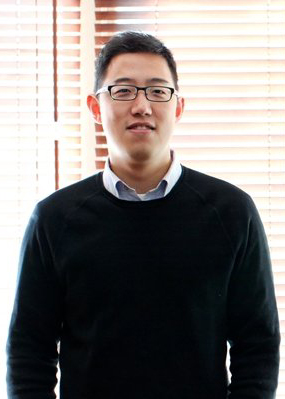Assistant Professor Edward Kim’s new app uses gamification techniques to engage users and help them live healthier lives
From ‘Oregon Trail’ to ‘Call of Duty,’ video games have captivated audiences for decades. But a new trend—gamification—is turning a platform traditionally associated with entertainment into a functional way to gather data, enhance people’s life choices, and more.


From Oregon Trail to Call of Duty, video games have captivated audiences for decades. But a new trend—gamification—is turning a platform traditionally associated with entertainment into a functional way to gather data, enhance people’s life choices, and more.
Edward Kim, assistant professor of interactive multimedia (IMM) and computer science, is at the forefront of this emerging field. Together with IMM majors Eliza Donne ’14 and Jared Krinsky ’14 and a collaborator from Rutgers, Kim developed wHealth, an award-winning interactive application that aims to improve users’ health-related decision making.
wHealth puts users in the role of a recently graduated college student, where they make decisions governing the activities of their digital counterpart. For example, on a Saturday afternoon do you drink beer, watch TV, or meet up with a coworker? To show users the impact of their decisions, every choice has immediate and extreme health consequences. It’s a process called minimizing future discounting.
“When you make a decision to have a cigarette or drink a beer in real life, you feel good about yourself because those items provide instant gratification and you don’t see the negative health impacts immediately,” Kim said. wHealth attempts to minimize future discounting—to stop people from choosing instant gratification over healthy habits—by immediately showing the adverse effects of poor health choices.
“If you eat a pizza in the game you get diabetes; if you drink a beer you become obese,” Kim said.
Because wHealth combines aspects of video games with engaging storytelling techniques, it holds the user’s interest, which enables it to collect meaningful data, Kim said. That’s why games such as wHealth can have a bigger impact on a person’s health choices than conventional applications, like quit smoking apps, he said.
“There is no engagement in those apps. The only hook is that people want to quit smoking, but there is nothing to keep that intrinsic motivation high for users.”
As for wHealth’s effectiveness in influencing users’ future decision making, Kim said, “The data is still preliminary, but on a personal note, I haven’t seen a doctor in years. After playing this game, I made an appointment to see one in the next month.”
Posted on November 7, 2013

